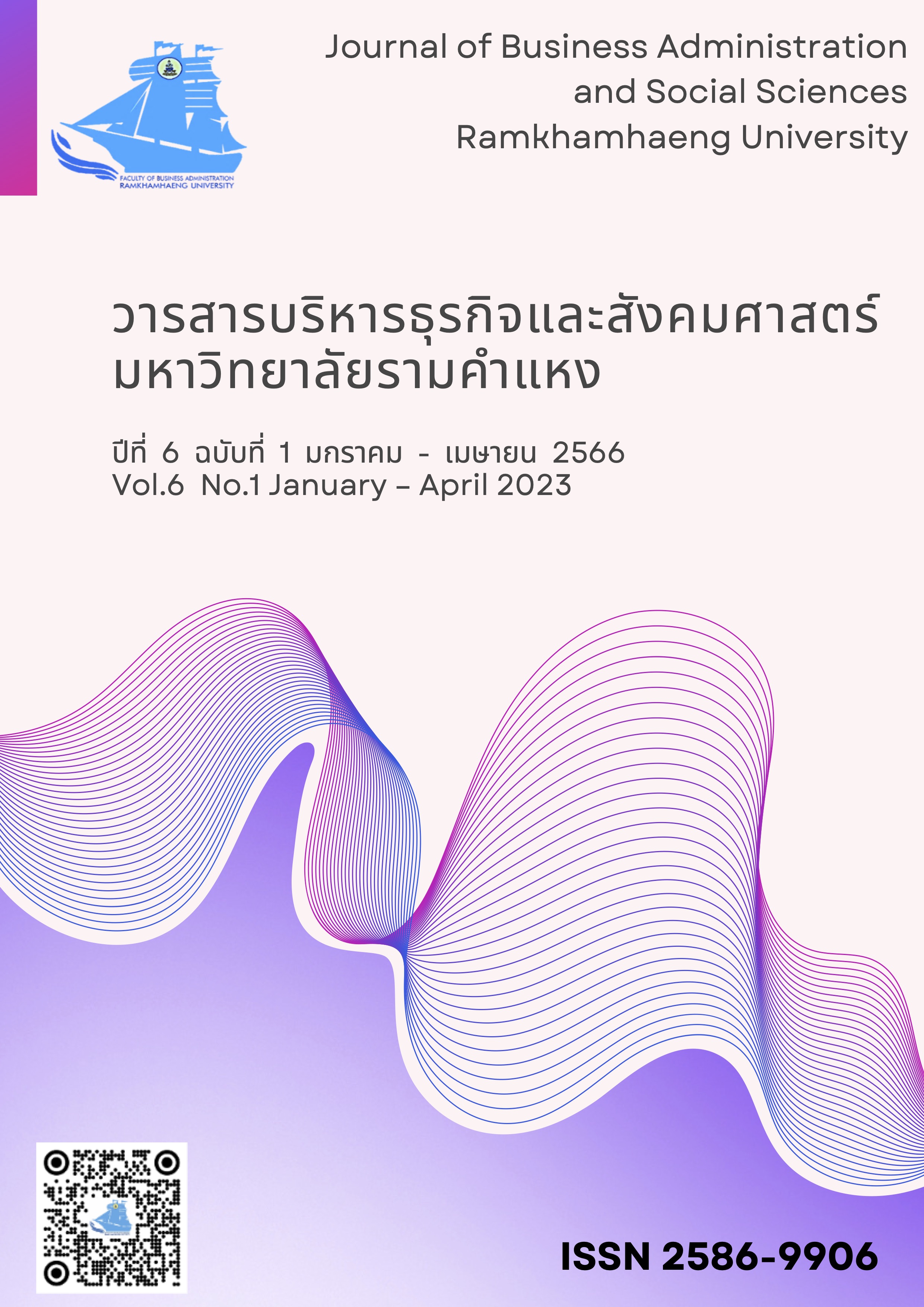The Cruise Industry: Tourism Impacts on National Development
Main Article Content
Abstract
In this article, the researcher analyzes the cruise industry which is considered to be a type of tourism. The researcher proposes concepts towards the cruise industry in the aspects of economy, society, culture, and the environment. The cruise industry has been continuously expanding except for a standstill during the COVID-19 pandemic. Moreover, Thailand has a policy that determines the cruise industry as one of the target groups of tourists as found in the National Tourism Development Plan, Volume Two (2017-2021) and Volume Three (2023-2027). It is also one of the ten target industries being supported in accordance with the policy of the Eastern Economic Corridor (EEC). Short- and medium-term plans are determined to accommodate cruise tourism because it is expected to have positive impacts on the country’s economy. However, the impacts on other aspects should be taken into consideration as important factors as well.
Article Details

This work is licensed under a Creative Commons Attribution-NonCommercial-NoDerivatives 4.0 International License.
เนื้อหาและข้อมูลในบทความที่ลงตีพิมพ์ในวารสารบริหารธุรกิจและสังคมศาสตร์ มหาวิทยาลัยรามคำแหง ถือเป็นข้อคิดเห็นและความรับผิดชอบของผู้เขียนบทความโดยตรง ซึ่งกองบรรณาธิการไม่จำเป็นต้องเห็นด้วย หรือร่วมรับผิดชอบใดๆ
บทความ ข้อมูล เนื้อหา รูปภาพ ฯลฯ ที่ได้รับการตีพิมพ์ในวารสารบริหารธุรกิจและสังคมศาสตร์ มหาวิทยาลัยรามคำแหง ถือเป็นลิขสิทธิ์ของวารสารบริหารธุรกิจและสังคมศาสตร์ มหาวิทยาลัยรามคำแหง หากบุคคลหรือหน่วยงานใดต้องการนำบทความทั้งหมดหรือส่วนหนึ่งส่วนใดไปเผยแพร่ต่อ หรือเพื่อกระทำการใดๆ จะต้องได้รับอนุญาตเป็นลายลักษณ์อักษรจากวารสารบริหารธุรกิจและสังคมศาสตร์ มหาวิทยาลัยรามคำแหง ก่อนเท่านั้น
References
คณะกรรมการนโยบายการท่องเที่ยวแห่งชาติ. (2560). แผนพัฒนาการท่องเที่ยวแห่งชาติฉบับที่ 2
(พ.ศ. 2560 - 2564). กรุงเทพฯ: สำนักงานกิจการโรงพิมพ์องค์การสงเคราะห์ทหารผ่านศึก.
คณะกรรมการนโยบายการท่องเที่ยวแห่งชาติ. (2565). (ร่าง) แผนพัฒนาการท่องเที่ยวแห่งชาติฉบับที่ 3 (พ.ศ. 2566 - 2570). สืบค้นจาก https://anyflip.com/zzfck/kiel/basic
ชนัญญา ภิราญคำ. (2560). ประชาชนกับกฎหมายสิ่งแวดล้อม. สืบค้นจาก http://www.mnre.go.th/attachment/iu/download.php?WP=rUIjnJ00qmMZZJ1CM5O0hJatrTgjWz01qmEZA21CM5O0hJatrTDo7o3Q
เดือนเพ็ญ ลิ้มศรีตระกูล. (2539). ซีทราน-อันดามัน ปริ๊นเซส เจ้าหญิงเหนือไฟใต้น้ำ. นิตยสารผู้จัดการ. สืบค้นจาก http://info.gotomanager.com/news/details.aspx?id=5365
นครินทร์ ทั่งทอง. (2560). พฤติกรรมการท่องเที่ยวของนักท่องเที่ยวเรือสำราญในท่าเรือแวะพักเกาะสมุย. ใน มหาวิทยาลัยราชธานี, การวิจัย 4.0 เพื่อการพัฒนาประเทศสู่ความมั่นคง มั่งคั่ง และยั่งยืน,
การประชุมวิชาการเสนอผลงานวิจัยระดับชาติ ครั้งที่ 2, อุบลราชธานี, 570-580.
ประภาภรณ์ โรจน์ศิริรัตน์. (2564). มาตรการทางกฎหมายในการเยียวยาผู้ที่ได้รับผลกระทบจากฝุ่นมลพิษ. วารสารนิติศาสตร์และสังคมท้องถิ่น. 5(1), 141-176.
ยุพวรรณ นังคลาภิวัฒน์. (2559). การผลิตบัณฑิตเพื่อเข้าสู่ธุรกิจเรือสำราญในโลกยุค AEC. ใน มหาวิทยาลัยศรีปทุม, การประชุมวิชาการระดับชาติและนานาชาติ มหาวิทยาลัยศรีปทุม ครั้งที่ 11, กรุงเทพมหานคร, 584-592.
ไพฑูรย์ มนต์พานทอง. (2558). การท่องเที่ยวเรือสำราญ กับความท้าทายของประเทศไทย. TAT Review Magazine, 45-59.
ไพฑูรย์ มนต์พานทอง. (2560). การวิเคราะห์องค์ประกอบการจัดการท่าเรือแบบผสมกับบริบทการท่องเที่ยวเรือสำราญ. WMS Journal of Management, 6(3), 107-124.
ราณี อิสิชัยกุล. (2561). Cruise Tourism บริบทการท่องเที่ยวเรือสำราญ. สืบค้นจาก http://sms.stou.ac.th /?p=139039
ราณี อิสิชัยกุล. (2561b). Cruise Tourism2 การท่องเที่ยวเรือสำราญ: ปัญหาและอุปสรรค. สืบค้นจาก http://sms.stou.ac.th/?p=139037
วารุธา ปรีชาวณิชวงศ์, วาสนา ไพศาลอัคนี, ธนากร วันคณานนท์, สุกัญญา รัตนาวะศี และ ธัญญา พีรโกศิน. (2560). สถานการณ์การท่องเที่ยวเรือสำราญ. สืบค้นจาก http://ttaa.or.th/wp-content/uploads/2016/04/Newsletter-6-ฉบับเดือนเมษายน - มิถุนายน-2560.pdf
สามัคคี บุณยะวัฒน์. (2555). การประเมินผลกระทบสิ่งแวดล้อม. ใน พระราชประสงค์ในพระบาทสมเด็จพระเจ้าอยู่หัว, สารานุกรมไทยสำหรับเยาวชน เล่มที่ 37, 211-235. กรุงเทพฯ.
สำนักงานคณะกรรมการนโยบายเขตพัฒนาพิเศษภาคตะวันออก. (2560). แผนปฏิบัติการการพัฒนาและส่งเสริมการท่องเที่ยวในพื้นที่ระเบียงเศรษฐกิจพิเศษภาคตะวันออก พ.ศ. 2560 - 2564. สืบค้นจาก https://www.eeco.or.th/file/868/download?token=h4qnALrk
สำนักงานคณะกรรมการนโยบายเขตพัฒนาพิเศษภาคตะวันออก. (2561). แผนปฏิบัติการพัฒนาและส่งเสริมการท่องเที่ยวในเขตพัฒนาพิเศษภาคตะวันออก. กรุงเทพฯ.
สำนักงานส่งเสริมภูมิปัญญาท้องถิ่นและวิสาหกิจชุมชน. (2564). OTOP นวัตวิถี คืออะไร. สืบค้นจาก https://cep.cdd.go.th/otop-นวัตวิถี-คืออะไร
สุพรรณี สวนอินทร์. (2562). การพัฒนากฎหมายของประเทศไทยเกี่ยวกับการประกอบกิจการเรือสำราญระหว่างประเทศ. (รายงานการวิจัย) ชลบุรี: มหาวิทยาลัยบูรพา.
สุรพร มุลกุณี. (2560). แนวทางการพัฒนาการจัดการท่าเรือสำหรับการท่องเที่ยวเรือสำราญของประเทศไทย กรณีศึกษาท่าเรือแหลมฉบัง. วิทยานิพนธ์ศิลปศาสตรมหาบัณฑิต (การจัดการการท่องเที่ยวแบบบูรณาการ). กรุงเทพมหานคร: สถาบันบัณฑิตพัฒนบริหารศาสตร์.
Brida, J. G., & Aguirre S. Z. (2008). The Impact of the Cruise Industry on Tourism Destinations. Sustainable Tourism as a Factor of Local Development, 1-4.
Brida, J. G., & Aguirre S. Z. (2010). Cruise Tourism: Economic, Socio-Cultural and Environmental Impacts. Leisure and Tourism Marketing. 1(3), 205-212.
CBI Ministry of Foreign Affairs. (2021). The European Market Potential for Cruise Tourism. Retrieved from https://www.cbi.eu/market-information/tourism/cruise-tourism/
Cruise Lines International Association. (2020). 2019 Cruise Trends & Industry Outlook. Retrieved from https://cruising.org/-/media/eu-resources/pdfs/CLIA%202019-Cruise-Trends--Industry-Outlook
Cruise Lines International Association. (2020). 2021 State of the Cruise Industry Outlook. Retrieved from https://cruising.org/-/media/research-updates/research/2021-state-of-the-cruise-industry_optimized.ashx
Cruise Lines International Association. (2017). 2017 Annual Report. Retrieved from https://cruising.org/-/media/research-updates/research/featured/2017-annual-report.ashx
Dowling, K. R. (2006). Cruise Ship Tourism. UK: CAB International.
Gibson, P. (2006). Cruise Operations Management. MA: Butterworth-Heinemann.
Jones, P., Hiller D., & Comfort, D. (2016). The Environmental, Social and Economic Impact of Cruising and Corporate Sustainability Strategies. Athens Journal of Tourism, 3(4),
-285.
Klein, R. A. (2011). Responsible Cruise Tourism: Issues of Cruise Tourism and Sustainability. Journal of Hospitality and Tourism Management, 18(1), 107-116.
Mekong Tourism Coordinating Office. (2015). Experience Mekong: Greater Mekong Subregion Tourism Marketing Strategy and Action Plan 2015 - 2020. Bangkok.
Papathanassis, A. (2020). The Growth and Development of the Cruise Sector: A Perspective Article. Tourism Review, 75(1). 130-135.
Seidl A., Giuliano F., Pratt L., Castro R., & Majano, A. (2005). Cruise Tourism and Community Economics in Central America and the Caribbean: The Case of Costa Rica. The Latin American Center for Competitiveness and Sustainable Development (CLADS).


